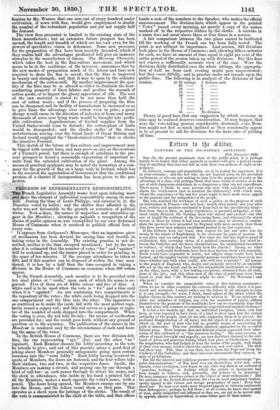PROGRESS OF REPRESENT.A.TrVE RESPONSIBILITY. THE French Legislative Assembly seems bent
upon infusing more and more the element of individual responsibility among its mem- bers. During the time of Louis Philippe, and anterior to it, the Deputies voted by ballot; and the shelter thus afforded to the voter was not favourable to the growth or retention of political -virtue. Now-a-days, the names of majorities and minorities sp- oor in the 3foniteur ; showing as palpable a recognition of the olaims of public opinion as was exemplified by our own Reformed House of Commons when it resolved to publish official lists of
• every vote.
It appears from Galignani's Messenger, that an ingenious piece of mechanism has been devised for saving time and trouble in baring votes in the Assembly. The existing practice is not de- scribed, neither is the time occupied mentioned ; but by the new -plan it is estimated that the number of votes " for " and "against" 'will be reckoned up, and the names placed in order for printing, in the space of ten minutes. If the average attendance be taken at 650, and if this number can be disposed of within the time men- tioned, it is less by a half than the time occupied in taking a division in the House of Commons on occasions when 500 voters appear. In the French Assembly, each member is to be provided with ten steel plates or "cards," upon each of which his name is en- graved. Five of them are of white colour and five of blue. A white card is to be used when the vote is "for" and a blue card when it is " against." An urn containing two compartments is the repository of the votes ; the white cards being dropped into the one compartment and the blue into the other. The apparatus is so contrived as to make the cards fall with the most perfect regu- larity round a copper rod ; and this rod serves as a gauge or regis- ter of the number of cards dropped into the compartment. When the voting is over, the rod tells its tale ; the means of verification are provided for ; and the result goes forth without any ground of question as to the accuracy. The publication of the names in the Monittur is rendered easy by the circumstance of each card bear- ing the name of the voter.
In the British House of Commons, there are two division-lob- bies, the one representing " aye " (for) and the other "no" (against). Each Member chooses his lobby according to the vote he intends to give ; and out of this practice arises a good deal of joking about Members generally antagonistic going upon certain occasions into the "same lobby." Each lobby having received its quota of Members, the doors are fastened, and the four tellers take their stations, two and two, at the respective doors. Inside, the Members are making a circuit, and passing one by one through a kind of toll-bar : as each passes through he utters his name, and the clerk in attendance, who holds in his hand a printed list of all the Members, makes a mark opposite the voter's name, with a pencil. The doors being opened, the Members emerge one by one into the House and the tellers count them as they pass. This operates as a check upon the jottings of the clerks. The result of the vote is communicated to the clerk at the table, and that officer hands a note of the numbers to the Speaker, who makes the official announcement. The division-lists, which appear in the printed " Votes " issued every morning, are merely it copy of the names marked off in the respective lobbies by the clerks. A mistake in a name does not occur above three or four times in a session.
A fair comparison between the two plans cannot be instituted till the working of the French one has been fully tested. The point is not without its importance. Last session, 329 divisions took place in the House of Commons; and, allowing fifteen minutes for each, we have an amount of time equal to eight per cent of the entire period of the session taken up with divisions. But this does not convey a sufficiently accurate view of the case. Were the divisions fairly distributed over the whole sittings, the appropria- tion of half an hour each evening might pass unquestioned ; but they occur fitfully, and in practice make sad inroads upon the public time. The following is an analysis of the divisions of last session. At 26 sittings 1 division each.
36— 2 — 10 — 3 — 12 — 4 --- 10 6 -- • 7 6 -- 5— 7 2— 8
1 — 10 — 44 — No division.
Plenty of proof here that any suggestion by which economy in time may be realized deserves consideration. It may happen, that were the vote-taking process considerably shortened, some Mem- bers might not feel so much inclined as they occasionally appear to be at present to call for divisions for the mere sake of putting off time.


























 Previous page
Previous page